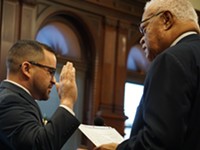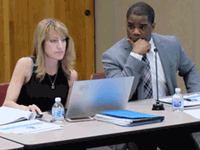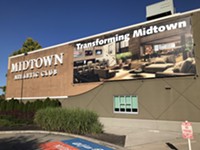[
{
"name": "500x250 Ad",
"insertPoint": "5",
"component": "15667920",
"parentWrapperClass": "",
"requiredCountToDisplay": "1"
}
]
You don't see lawn signs up, and the election's not until next fall, but Rochester's campaign for mayor has already started. Candidates have begun raising money and lobbying political-party committee members.
Before we start thinking about who we want, though, we ought to talk about what we want. What are the city's challenges? What qualifications --- what experience, what skills --- are needed to meet them?
The challenges are enormous. Expenses will continue to grow while the city struggles to strengthen its tax base. But there are also enormous opportunities. Rochester, as Mayor Bill Johnson points out frequently, is in far better shape financially than many cities, particularly those in New York State. And despite tight budgets, both Johnson and his predecessor, the late Tom Ryan, built records of exceptionally good and creative stewardship. With the right person as the next mayor, Rochester can build on those records.
Here's my list of qualifications for the new mayor, with input from several long-time City Hall observers.
1) Regional leadership ability. The city didn't cause its most serious problems --- declining tax base, failing schools, large areas with high poverty and crime rates, weak retail downtown. And it cannot solve those problems by itself.
The problems are the result of housing and businesses moving to the suburbs and the decline of manufacturing. The city, and the next mayor, will need the support of county officials, suburban leaders, state leaders. The mayor will have to convince the residents of the suburbs that the city's health is crucial to the health of the entire region. That a healthy, vibrant downtown will attract businesses and residents to the region.
With a weak city, "Greater Rochester" will simply be a collection of small, independent towns, with no state or national presence. The individual communities in New York State are so firmly separated that they seldom operate as a whole. And states in which regions do operate as a whole are cleaning our clock.
The next mayor will have to continue Bill Johnson's bold push for regionalism. Johnson's fate in last year's county-executive race may intimidate his successor. It must not; no issue is more important to this community, and there is no better way to lift this community out of its economic decline.
2) Decisiveness. The mayor may also have to convince city residents to make some hard choices --- and he must have the backbone to stand up to pressure.
For instance: Should the city spread its public investment around --- a little for each neighborhood and some for downtown? Or, with declining resources, should it focus on a few areas where there's the best chance of the biggest payoff?
Should it, for example, say no to some neighborhood requests in order to do more downtown? This is a long-standing dilemma, and it's a tough one. All city residents deserve a decent quality of life: good public safety, clean streets, repaired sidewalks. When neighborhoods decline, residents who can leave, leave.
But downtown housing development has begun to take off. Some observers think that it's nearing critical mass, especially in the East End. That we're not far from having enough housing to support a variety of small retail and service businesses --- and yes, a small grocery or two, of the kind found in downtowns of thriving large cities.
But public investment in downtown housing could include incentives to develop more housing for middle and upper-income residents. That could bring more residents downtown, and they would support more retail, restaurants, clubs, and arts venues. And that would raise the tax base for the entire city. City residents and businesses could pay less in property taxes. The city could provide more money for the school district or for neighborhoods.
Would neighborhood residents be willing to defer to the needs of downtown? Should they?
3)Administrative skills. Years ago, Rochester had a "weak mayor," city-manager form of government. The mayor was the public presence. The city manager was the person with the strong management skills and experience.
Now we have an elected mayor, who needs to be both the public presence and the manager --- or delegate the administrative role to someone else. Any new mayor has the opportunity to appoint department heads who will carry out the mayor's vision and do a good job. A new mayor must be able to determine which staff from the previous administration should stay on, and which should be replaced.
4) Vision. The Greater Rochester area has a habit of timidity, of thinking small, of being risk averse. Thinking small will get us nowhere. Most certainly, City Hall must spend the public's money carefully. But the mayor must be more than a coin counter.
The entire Greater Rochester area needs bold vision, creativity, and backbone, and the mayor can lead in those areas. We need to find ways to be innovative --- and to build on strengths that we have and other regions don't. (A dismaying example of our small, me-too vision: the proposal for a casino for the Sibley's Building.)
Bold ideas and daring don't always have to involve public funds. The downtown housing currently under way is being done with private investment. Chicago's fabulous, bold Millennium Park was heavily financed with private donations, but Chicago Mayor Richard Daley was a prime mover.
Bold ideas and daring will also be necessary to address one of the city's most important problems: schools. The push continues in some quarters for City Hall to take control of the school district. I have mixed feelings about that, principally because it doesn't address the root cause of the school's problems: concentrated poverty.
I am convinced that working together, the school district and City Hall can craft a plan to make Rochester schools a countywide attraction. And even before that, the district, with City Hall's help --- and without much money! --- can attract city residents who now flee to private and parochial schools.
More on that later. Meantime, it's time to start thinking about Bill Johnson's successor. What do you want in a mayor?
Speaking of...
-

Martin Luther King Jr. Day commemorations to stream and attend
Jan 14, 2021 -

New year, new City Council
Jan 2, 2020 -

Warren wins Dems’ committee votes
May 4, 2017 - More »
Latest in Columns
More by Mary Anna Towler
-

Police reform: advocates on what should come next
Oct 22, 2019 -

Court clears the way for Police Accountability referendum
Oct 17, 2019 -

Dade outlines initial actions on district deficit
Oct 9, 2019 - More »





